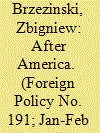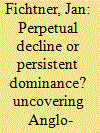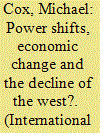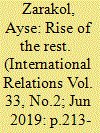|
|
|
Sort Order |
|
|
|
Items / Page
|
|
|
|
|
|
|
| Srl | Item |
| 1 |
ID:
110478


|
|
|
| 2 |
ID:
151645


|
|
|
|
|
| Summary/Abstract |
The prediction of America’s decline is a regularly recurring phenomenon; this also pertains to the pivotal field of global finance. This article argues that, first we have to consider the United States together with the other Anglophone countries. The English-speaking countries and territories – Anglo-America – have deep common political and socioeconomic roots, of which the unique global Five Eyes intelligence cooperation is merely one manifestation. In finance, New York and London (NY-LON) constitute the decision-making core of this transnational formation. Second, to analyse the highly complex phenomenon of structural power in the globalised international political economy we have to dig deeper to uncover truly meaningful data. Thus, this article evaluates data for nine central segments of global finance from around the year 2000 to 2014. Contrary to the assertions of many declinists, these data show that Anglo-America’s dominant structural power has been persistent during this period. Moreover, four novel visualisations show that the US-UK axis is the fulcrum of the international financial system. However, contemporary global finance is characterised by a high degree of latent fragility; significant imbalances, inequalities and contradictions persist and are even likely to grow, potentially undermining the legitimacy and the stability of the whole system.
|
|
|
|
|
|
|
|
|
|
|
|
|
|
|
|
| 3 |
ID:
119269


|
|
|
|
|
| Publication |
2012.
|
| Summary/Abstract |
It has become the new truth of the early twenty-first century that the Western world we have known is fast losing its pre-eminence to be replaced by a new international system shaped either by the so-called BRICs comprising Brazil, Russia, India and China, the 'rest', or more popularly by that very broadly defined geographical entity known as Asia. This at least is how many economists, historians and students of world politics are now viewing the future of the larger international system. This essay does not dispute some self-evident economic facts. Nor does it assume that the world will look the same in 50 years time as it does now. It does, however, question the idea that there is an irresistible 'power shift' in the making and that the West and the United States are in steep decline. Specifically, it makes a number of critical arguments concerning the new narrative. First, it suggests that this story, by reasonably focusing on what is obviously changing in the world, unfortunately ignores what is not; as a result, it underestimates what might loosely be termed the continued structural advantages still enjoyed by the United States and its major Western allies. Second, while it is true that many new states are assuming a bigger role in the world economy, their rise needs to be looked at more carefully than it has been so far; indeed, when such an examination is undertaken, it becomes increasingly clear that the rise of others - including China - is still hemmed in by several obstacles, internal as well as external. Third, though the Asian region, and China as part of it, is assuming an ever more important role in the wider world economy, this development should not be seen as marking the beginning of a new Asian Century. This now popular idea is not only conceptually problematic, it inevitably leads to an underestimation of other key areas in the world including incidentally the Transatlantic region. Finally I suggest that if the dubious idea of a power shift is taken to be true, this could very easily lead to greater international insecurity and conflict. Understanding the modern world better than many seem to be doing right now is therefore not only intellectually important; it is strategically necessary too.
|
|
|
|
|
|
|
|
|
|
|
|
|
|
|
|
| 4 |
ID:
167193


|
|
|
|
|
| Summary/Abstract |
The past decade has been characterised (among other things) by the emergence of a discourse about the ‘Rise of the Rest’. (Some) non-Western states have been described as ‘rising powers’ capable of agency in the international system and as potential partners for the West in global governance. This stands in contrast to a more traditional narrative that saw the non-West primarily as a source of international problems and a developmental project. Does this discursive shift signify a historic reversal in how the non-West understood by the West? The answer is complicated. In this article, I argue that the hype about ‘rising powers’ in Western policy circles following the Global Financial Crisis of 2007–2008 had little relation to an ‘objective’ analysis of actual structural shifts in favour of ‘the Rest’ and was more akin to a financial bubble, with speculation driving perceptions of ‘rising powers’. I also show that the ‘rising powers’ literature is better located within the broader (and long-standing) debate about the decline of the United States, and should be read more as a manifestation of American anxieties and hopes than as informing us about the choices or the motivations of the ‘rising powers’. Ironically, however, the Western hype nevertheless has helped along a structural shift that is under way, first by partly moulding reality in that direction (especially in the form of financial decisions), but more importantly by freeing non-Western powers (for better or worse) from their internalised cages of perceived inferiority and lack of agency in the modern international order.
|
|
|
|
|
|
|
|
|
|
|
|
|
|
|
|
|
|
|
|
|